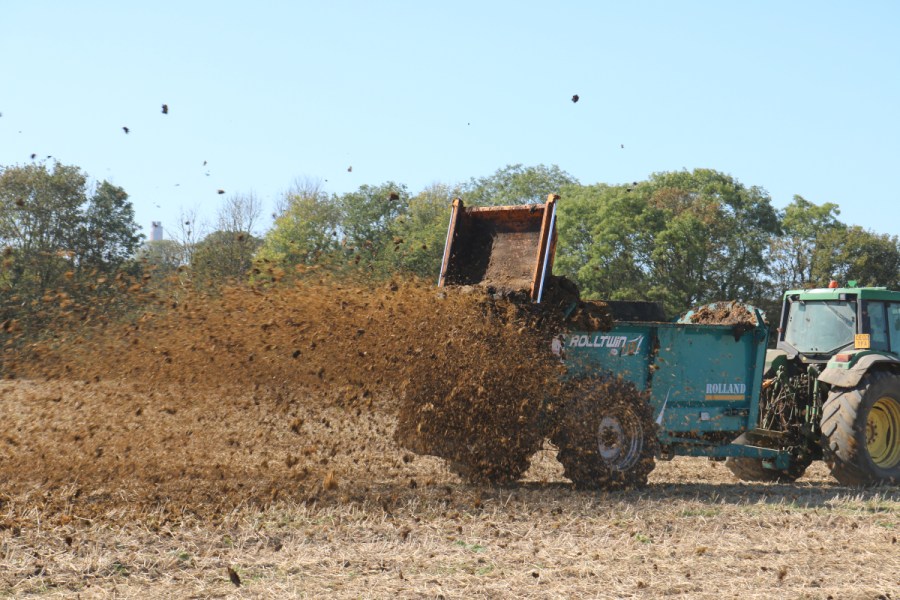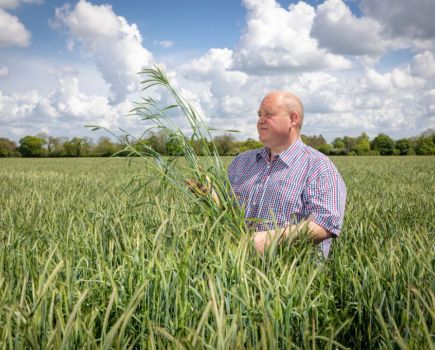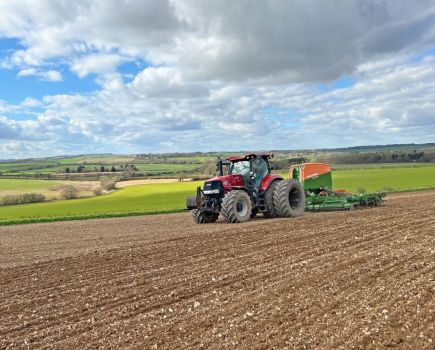As fertiliser prices soared, confidence both in food security and crop returns have broken from their tethers and the muck has begun to fly. CPM tracks the policy exchanges and current resolve around the need to feed.
The Government must ensure new ways for farmers and growers to manage their risk and volatility.
By Tom Allen-Stevens
After months of uncertainty, during which prices for inorganic fertiliser have more than tripled, Defra has finally published the steps it will be taking to support farmers in the coming growing season.
Applications of slurry and farmyard manure can be made during autumn and winter, provided growers take “reasonable precautions”, Defra announced as CPM went to press. Planned changes to the use of urea fertiliser will also be delayed by at least a year and an industry fertiliser roundtable, chaired by farming minister Victoria Prentis, has been convened. This will continue to work on these issues, identify solutions and better understand the impact of current pressures on farmers, says Defra.
It was at the NFU conference in February that farmer exasperation over difficulties with dealing with organic manure and soaring fertiliser prices came to a head. Merseyside grower and NFU North West combinable crops chairman Olly Harrison voiced the concerns of many arable farmers, who without access to ammonium nitrate fertiliser would face a 60% reduction in yields, he said.
“That obviously isn’t good for food security. We all know what’s happening in the Ukraine and Russia. Have you got a plan for fertiliser security?” he asked Defra secretary of state George Eustice.
“I think that this spike in fertiliser prices will cause more farmers to think carefully about where they get their fertilisers from. We could see more people looking at different technologies to use organic fertilisers and farmyard manures,” responded the Minister.
This drew jeers of disapproval from farmer delegates. “It needs a little more than a fairy tale that we can use more cow muck. It’s not being wasted, it’s simply not available,” said Olly.
NFU president Minette Batters backed this up. “The Farming Rules for Water effectively bans spreading all manures in the autumn on the growing crop. This is where a lot of the frustration in this room is coming from,” she said.
George blamed “ambiguous” EU litigation. “As soon as you put this into regulation, it becomes problematic. What we need to do now is issue very clear guidance to the Environment Agency about how they should interpret it. That’s what we’ll do.”
This new guidance was published on 30 March and there are four key elements to the criteria that will be taken into account by the EA in its enforcement of the regulations:
Planning – you should be able to demonstrate that you’ve planned applications in line with the Farming Rules for Water. This would include a nutrient management plan, for example, that takes into account crop need and shows a qualified source was referenced for the information. The nutrient content of organic manures should be assessed and taken into account.
Soil levels – you should consider N requirement based on an annual crop cycle. You should avoid applying organic manures that raise the soil P index above level 3, although there are specific exceptions here.
Risk of pollution –Different approaches should be taken depending on readily available nitrogen (RAN) content of organic manures. A low RAN is no more than 30% for which there’s no statutory application rate limit provided you’re taking “reasonable precautions” to mitigate against risk of pollution (which includes criteria above). For a RAN above 30%, for autumn and winter applications there’s a limit of 30m³/ha for general organic manures and 8t/ha for poultry manures, and no repeat applications for at least 21 days during the restricted time periods. For most soils on tilled land, that window runs from 1 October to the end of February. For sandy and shallow soils, restrictions start on 1 August.
Reasonable precautions – You should have established green cover by 15 October, which includes both commercial and cover crops. You are allowed an appropriate justification, such as delaying drilling for blackgrass and leaving medium and heavy soils to weather before a spring root crop. You should incorporate organic manure unless there’s a good agronomic reason not to. This would include when it’s applied to a growing crop or grassland or a precision application method is used.
Further details of the Sustainable Farming Incentive have also been published with flexible start dates on offer. SFI options include measures designed to help build the health and fertility of soil and to reduce erosion, such as payments to sow nitrogen-fixing plants and green manures in standing crops or before the cash crop is established.
Defra has also stated priorities to “pioneer new technologies to manufacture more organic-based fertiliser products, and rediscover techniques such as using nitrogen-fixing legumes and clovers as an alternative to fertiliser”.
A further £20.5M of grants has also been announced as part of the Government’s Farming Innovation Programme, launched last October to boost R&D and increase productivity. Projects could include tackling a crop pest or disease that is affecting productivity or a business may work in partnership with researchers to breed new crop species which are more resilient to a changing climate.
The NFU has given the announcement a cautious welcome. Minette noted that farmers are experiencing unprecedented costs when buying fertiliser, alongside tightening supplies. “The updated guidance on the Farming Rules for Water which will allow autumn manure spreading are positive for farmers,” she said.
“The move to a rolling application window for SFI will offer flexibility to farmers and growers to apply at a time that suits their business. This also needs to be matched by certainty over when agreements will start once an application has been submitted.
“While the offer available now will be suitable for some farms, it’s clear there are still not viable options for all. It’s essential for all farmers who wish to enter these new schemes that payment rates properly recognise the public goods they will be delivering. Farmers in England are facing a very different approach to the rest of the UK. The Government must ensure new ways for farmers and growers to manage their risk and volatility.”
NFU Deputy President Tom Bradshaw noted there will be a farming industry self-regulation approach to the use of urea. “Working alongside other farming organisations, such as AIC, we put forward a strong case to Defra for a robust and pragmatic industry-led approach, without which there would have been a ban on the use of solid urea fertilisers.”
Concerns grow for food security as policy dithers
Defra came under fire, both at the conference and at Westminster, for what’s seen as a lack of policy on food security. A group of influential MPs and peers has warned the Government may be “sleepwalking into its own food crisis”.
At the NFU conference, Minette Batters used her opening address to challenge the Government on its approach to food security. “Do we want and expect different things from our land than the rest of the world? A pretty park at home while we tuck into imported food produced in extremely intensive ways with huge environmental impact somewhere else?” she asked.
“We have completely contradictory government policies: raising the bar for environmental standards at home but pursuing trade deals which support lower standards overseas.”
Meanwhile, in a Westminster Hall debate, the Government was called on to put greater scientific rigour and evidence into UK food-policy development. MP for York Outer Julian Sturdy, who chairs the All-Party Parliamentary Group on Science and Technology in Agriculture (APPGSTA), requested “robust and meaningful metrics” for sustainable agriculture.
The debate sought to highlight the objective of “sustainable intensification”. This was identified a decade ago by Defra chief scientist Sir John Beddington as a route for the world to increase food production and availability by 70% by 2050. It was adopted into policy by Defra to help keep pace with the food needs of a rapidly expanding global population, in the face of climate change and increasing pressure on the world’s finite natural resources. Examples include the £4.5M invested in the sustainable intensification research platform (SIP).
But Julian indicated there were grave concerns about the current direction of travel of the Government’s future vision for agriculture and about where future policy is going. “We cannot afford to be complacent with something as fundamental as food security,” he said. “Without clear vision and a definition of what is meant by ‘sustainable agriculture’, the UK is at risk of sleepwalking into its own food crisis.”
He said that leading UK experts in crop science, agricultural economics, rural policy and conservation science had brought to the APPGSTA their concerns that current farm policy development lacks scientific rigour, and that policy focus on sustainable intensification had diminished.
“The outputs, recommendations and advice generated through the Defra SIP appear to have been quietly shelved and forgotten,” he stated.
Julian highlighted concern that the Global Farm Metric, promoted by the Sustainable Food Trust, “is firmly embedded in the Government’s thinking”. This measures the sustainability of food production on a per farm or per unit area basis, while a number of scientists have indicated the metric should be assessed per kg, or calorie equivalent, a food system yields.
“Will the Minister agree to submit the Global Farm Metric model to a process of independent scientific scrutiny and validation with leading academic experts in the field? Secondly, will she commit to facilitating a joint roundtable with our all-party group to take forward discussions on the development of robust and meaningful metrics for sustainable agriculture?” he asked.
“Everything I do in Defra is science-led,” responded Defra environment minister Rebecca Pow. “Our work has to be science-focused; we have to have evidence for what we do and how we make policy.”
She said that SIP hadn’t been forgotten and that Defra is gathering a “huge amount” of data and evidence as part of Test and Trials as well as its £75M R&D package, currently being implemented. “I think we are singing from the same hymn sheet,” she added.
Nevertheless, Defra appears to be singing out of tune with NFU. When asked by CPM at the conference whether Defra had lost direction when it comes to sustainable intensification, George Eustice pointed to the support it’s offering to the horticulture sector to boost production of fresh produce and displace Dutch imports.
“People often talk about things like vertical farming, but the real opportunities are in a whole new generation of heated glasshouses. That’s where the big opportunities lie when it comes to sustainable intensification,” he said.
Minette Batters told CPM she doesn’t “see any approach to innovation” in the way Defra is currently addressing food security. “I do think there’s going to be a lot more of that [glasshouse production]. But this is about focusing on the optimisation of every sector and we have got to get that right. If we just focus on agri-environment schemes [on arable land], we are not going to change the way we are producing our food and the way we are increasing our soil health.”
Coalition coercion leaves UK on its own
The UK Government has received renewed calls to join the US-led global Coalition on Sustainable Productivity Growth for Food Security and Resource Conservation (SPG).
This was launched by the by US Department of Agriculture secretary of state Tom Vilsack at the United Nations Food Systems Summit last September. More than 80 countries and organisations have officially declared their support for the coalition, including Australia, Brazil, Canada, Israel and New Zealand.
APPGSTA chairman Julian Sturdy wrote to the Prime Minister at the time, urging him to include the global coalition for agricultural productivity growth in the UK’s collaborative work programmes with the US. The MP for York Outer repeated his request during the Westminster Hall Debate in February.
Now the European Commission has indicated it will also be joining the coalition, in a statement released a month after the debate. The move, made to address EU food security in the light of the war in Ukraine, is being seen as something of a U-turn by the EU. Tom Vilsack had reportedly started the coalition to “counter” the EU’s Farm to Fork (F2F) strategy, indicating that F2F “sacrifices productivity in order to reach a sustainability goal”.
But the UK has yet to make its position on the coalition clear. During the debate, Rebecca Pow responded that Defra was “looking at it”. When George Eustice was asked about the coalition at NFU conference by CPM he said he hadn’t heard of it. “We’re involved in many of these different dialogues, there are a multitude of them, and we often attend them and take part,” he added.




